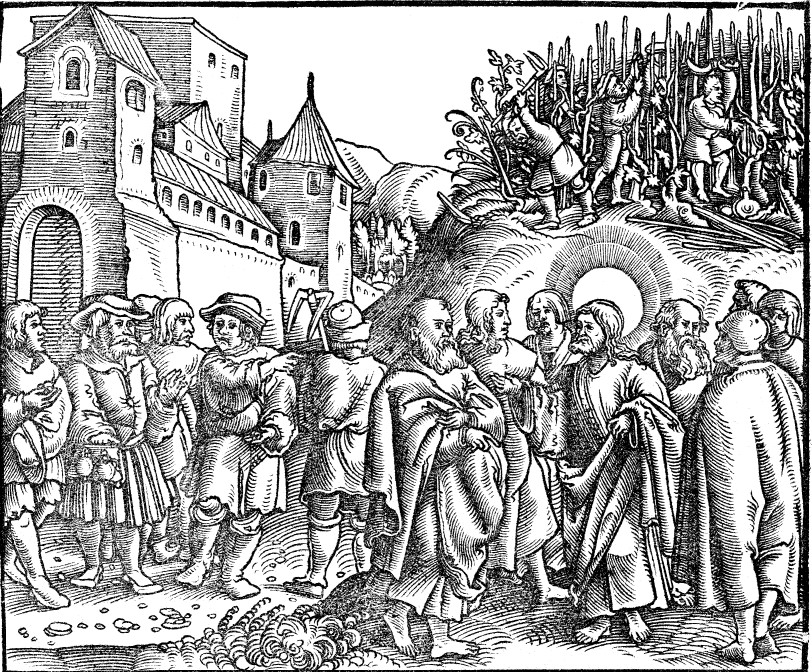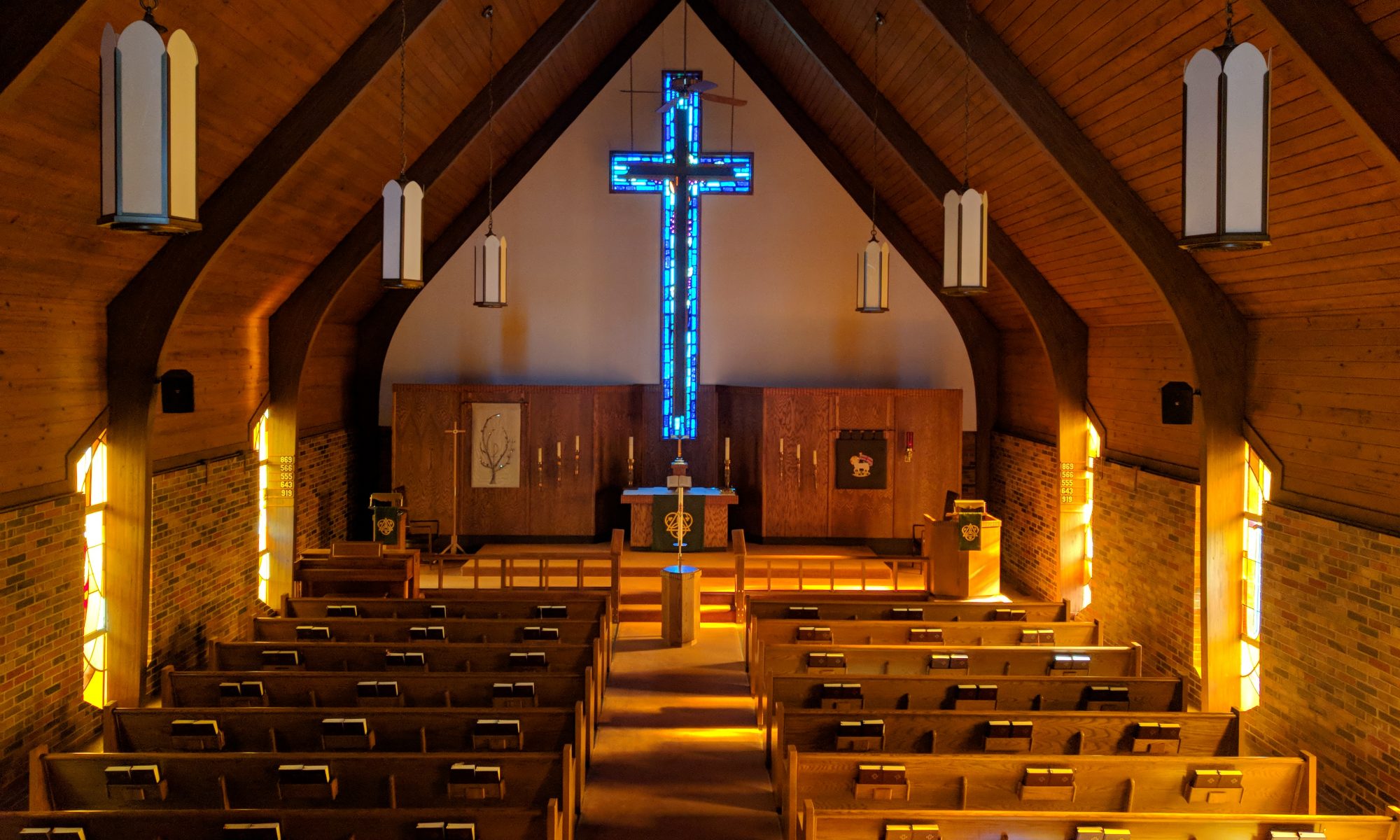
Lessons: Exodus 17:1-7, 1 Corinthians 9:24-10:5, Matthew 20:1-16
Hymns: LSB 869, 555, 566, 412, 919
Grace, mercy, and peace to you from God our Father and our Lord and Savior, Jesus Christ. Amen.
Today, Jesus speaks by way of parable. This is where He uses everyday situations, often twisting them or exaggerating them to teach a point about the Kingdom of God. By way of parables, Jesus teaches God’s children to dwell on God’s Word and draw near to Him. In many parables, Jesus is the active agent, and we can certainly interpret today’s parable to be that way. It also appears fitting to see our Heavenly Father as the landowner, or the master of the house.
In this parable, the master goes out at 6 a.m. to hire day laborers. They agree to a fair day’s wage, a denarius. They work in a vineyard—a type of garden where grapes are grown.
Now, before the Fall, it was the delight of Adam and Eve to work in the Garden of Eden. They had no difficulty with their labors, and their work resulted in complete satisfaction. But after the Fall of man into sin, work became difficult and painful—sweat, thorns, and thistles. And that labor ends with temporal death. But thankfully, Jesus uses the fruit of the vine to impart life. Grapes grown in vineyards and wheat grown by farmers are made into wine and bread. And these are blessed in the Divine Service with the Words of Institution so that the Body and Blood of Christ are consumed in the Lord’s Supper for the forgiveness of our sin.
When we hear about workers being hired in this parable, we also consider ourselves as workers in God’s kingdom, and this work ought to be considered a delight for us to do. What greater delight should we have as children of God than to work for our Heavenly Father?
Yet, many bristle at the thought. They want to take and take without giving. They have mastered the Biblical teaching of “Grace Alone” so well, knowing their works won’t save them, and so they figure they can live their own lives without engaging in good works. Or they figure they have more important matters in their lives.
Let’s remember there’s aways work to do in God’s kingdom, and our priorities teach our children what is truly important to us. Also, we remember vocation. As we work our jobs, fulfilling our stations in life, and helping our neighbors, we are doing pleasing work in God’s sight.
God does not need our works, but He uses them anyway. Our neighbors need our works. And we need our neighbors’ works.
So in this parable, Jesus is inviting us to get to work—not to obtain salvation, but to do good. Salvation is granted by grace through faith, as this parable teaches. And two chapters earlier in Matthew, Jesus extols the faith of children and infants, and upholds them as models of faith. He declared, “Truly, I say to you, unless you turn and become like children, you will never enter the kingdom of heaven. Whoever humbles himself like a child is the greatest in the kingdom of heaven” (Matt. 18:3-4). If a father asks his young child to help him work on something, that child is thrilled. He gets to spend time with his father. The child may try to be helpful, but it may not actually be helpful. The child may quickly lose interest or do it wrong. But the father is pleased with his child anyway. He fixes what is wrong, and he uses even the most minute things the child accomplished.
That’s how it is when we work for our Heavenly Father. We should be thrilled to have the opportunity, and God will use what we’ve done and fix what we didn’t do right. And, as this parable teaches, our eternal reward has nothing to do with our labors.
The parable continues with the master going out and finding more people standing idle. There’s an implied rebuke against them as he asks, “Why do you stand here idle all day?” Yet, he graciously tells them to go into the vineyard and promises to give them whatever is right.
Such it is with God’s kingdom. God will give whatever He deems right from what is His to those who are added to His family. Those added early in life and those added late in life will receive whatever God deems to be right. In the parable, it is a denarius. As Christians, God grants us eternal life through Christ who died for us on the cross.
So, at the end of the day, the master pays them. Those who worked for just one hour received a denarius. Those who worked three, six, and nine hours also received a denarius. You would think that if one hour results in a denarius, three hours would result in three. But not so in this parable. That’s because the amount they receive is not based on their work, but in what the master wishes to do as He pleases with His things out of His goodness.
I know that’s not how things work in this world. This parable is not instructing employers to pay unfair wages. Instead, this parable is teaching us that salvation is granted by grace—out of God’s favor toward us which we do not deserve and cannot earn. This parable is teaching us that God gives us what is good. And this parable teaches us that He gives us of what belongs to Him and remains His possession.
You see, when it comes to being received into God’s favor or being received into God’s family or being received into Heaven, we don’t earn them. He gives them to us for free. He freely does what He wants with His things. This means He freely gives us the gift of salvation.
Even though Adam and Eve were told their daily work will be a burden due to their sin, God still promised to them something they definitely did not deserve—a Savior—Christ the Lord. He promised that, from her seed, One would come who would remove the guilt of their sin and reconcile them with God their Father. He would come to pay their deep debt of sin and grant them forgiveness of sins, eternal life, and everlasting salvation. And this Messiah would not only do this for them, but also for all their descendants. This means salvation is available to everyone who has ever walked the face of the earth.
However, not everyone will be saved. Those who do not receive Christ’s salvation will not be saved. They must show up in the vineyard. They are to be brought into God’s family through Holy Baptism and sustained in the faith through the vineyard of Christ’s Church. They are to be grafted onto the vine, Christ, and, being branches, they receive His blessings through Word and Sacrament. God does not grant salvation apart from these means.
The workers who were hired first were the last to receive their pay. They had agreed to a denarius, but when they see those who worked far less each receiving a denarius, they figured they would now receive more. They’re lawless, for they don’t want to keep the contract they made with the master of the vineyard. They want more. They think they deserve more than their agreed-upon wage.
For they don’t think like our Heavenly Father—by grace alone. Clearly, they don’t make any effort to think like God does. And so, when the master gave them each a denarius, they grumbled, for they worked through the heat of the day. Those who worked less were made equal to them. They were basically saying, “That’s not fair!”
Now, accusing God of being unfair will never end well. If we want what is fair, we will all die in our sin and go to Hell. If we want what is fair, Jesus should never have left His throne to become a Man and die on the cross as the Guilty One to pay for the world’s sin.
But because God is good, He gives us far more than what we could conceive to be fair. He not only made us all equals in Christ, but He has made us equal to Christ. We are adopted as sons of God. Jesus is now our Brother. We have received what is Christ’s. And because He lives, He grants us that same gift of life. When we will rise on the Last Day, we will be given glorious bodies, not unlike Christ’s own Body. We receive such blessings simply because God is good.
The master takes one of the complainers aside and said, “Friend, I am doing you no wrong. I wish to give as I please from my own possessions.” Then he says two things that should give us pause. The first is, “Take what is yours and go.” We love hearing words like this. Take and leave. We want to take as much as we can. And go our way with it, as if God should have no say on how we use His things.
But remember who is speaking. What can we take from God that doesn’t already belong to Him? And where would we go? This could be an accusation. “Take what earthly things you think belong to you and leave. Abandon the eternal inheritance Christ has earned for you.” It’s like saying, “Go and be that prodigal.” Instead, we should want to draw near to our Lord and realize all that is ours is on loan from Him. We are stewards of His things. The last thing we should want is to leave God our Father and His Son.
The second thing He said is, “Is your eye evil because I am good?” (Our translation poorly paraphrases it as, “Or do you begrudge my generosity?”). Evil eyes not only look at evil things with delight (the Greek word here for evil is where we get the word porn), but evil eyes look at the good things of God and calls them evil. Those who worked all day are accusing the master being evil for his graciousness. God is often accused of being evil when He is doing good. Jesus performed miracles and people wanted to kill Him. We are given forgiveness and people are angry that we sinners have our sins cancelled out for free. We are tempted to resent those who have sinned against us when they are reconciled to God. And so, we repent and cling to Christ’s grace.
We have to agree that God is allowed to do what He chooses with what belongs to Him. For He only chooses the good; He is not evil. And the good which He has chosen is what is best for us. After all, He, in grace, sent His only-begotten Son to save us from our sin. Amen.
The peace of God which passes all understanding keep your hearts and minds in Christ Jesus to life everlasting. Amen

